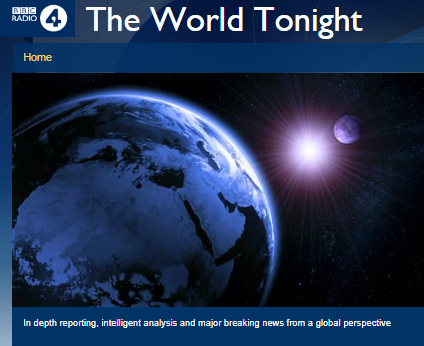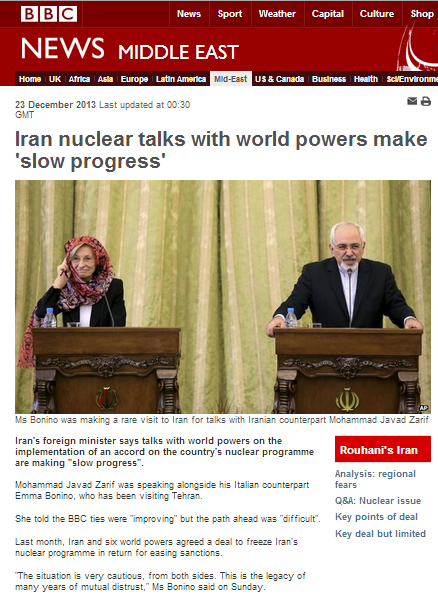As we saw in a previous post, a BBC News website article uncritically amplified the findings of a UN Human Right Council inquiry into the ‘Great Return March’ while portraying violent rioting as “protests”, failing to explain the aim of the demand for ‘right of return’, refraining from noting the long-standing UNHRC bias against Israel, failing to clarify the inbuilt bias of the inquiry’s mandate, ignoring the fact that a significant proportion of those killed in the violent rioting have been shown to be linked to terror groups and promoting the false notion that under-18s, paramedics and journalists are exclusively ‘civilians’.
Listeners to BBC Radio 4 also heard reports on the same story – but were they any better?
The February 28th edition of ‘The World Tonight’ included a news bulletin (from 03:45 here) in which audiences were told that: [emphasis in bold added, emphasis in italics in the original]
Newsreader: “Israel has rejected a UN report which found that the country may have committed crimes against humanity when its soldiers fired on Palestinian protesters in the Gaza Strip last year. In nine months of demonstrations 189 people died including 35 children. Investigators said there could be no justification for killing children and people clearly marked as journalists and medics. The Israeli government described the document as a new record of hypocrisy and lies.”
In addition to failing to clarify that the report was commissioned by the partisan UNHRC, that portrayal once again frames violent rioting as “demonstrations” and the people taking part as “protesters”. As in the BBC’s written report, the investigators were blindly quoted with no clarification of the fact that some of those “children and people clearly marked as journalists and medics” have been shown to have links to terror groups.
Later on in the same programme (from 20:35), presenter James Coomarasamy interviewed one of the report’s authors in relation to what he began by describing as “a highly critical report by the Human Rights Council”.
Coomarasamy: “It examined the deaths last year of nearly 200 people who were shot by Israeli soldiers during protests along Israel’s border with the Gaza Strip. The Bangladeshi lawyer Sara Hossein is one of the report’s authors.”
Coomarasamy did not clarify to listeners that none of the report’s three authors have any expertise in military operations.
Following an overview from Hossein of the inquiry’s findings, Coomarasamy noted that:
22:14 Coomarasamy: “You call them civilian protests. You acknowledge though that there were militants among the protesters. They were organised by Hamas.”
Hossein: “We don’t actually say that the protests were purely organised by Hamas. We say that Hamas as a political body had involvement in the organising and that Hamas members did take part in the protests as well.”
Coomarasamy failed to challenge Hossein’s absurd claim of a distinction between ‘political’ Hamas and its ‘armed wing’.
Later on in the interview (23:50) Coomarasamy did raise the topic of UNHRC institutional bias against Israel but despite acknowledgement of that issue by former UN officials, presented it using the BBC’s favoured ‘Israel says’ formula.
Coomarasamy: “The Israeli government says that you have […] an obsessive hatred of Israel, essentially saying that you single out Israel for these kinds of investigations and other countries in the region simply do not get the same kind of scrutiny.”
Hossein responded with the claim that “we’ve carried out the task that was given to us”, to which Coomarasamy replied:
Coomarasamy: “You don’t accept that Israel gets singled out, that it gets far deeper and closer scrutiny than other countries in the region?”
Hossein: “We interpreted our mandate as being to look at all parties and to look at their responsibility in the context of the protests.”
Coomarasamy made no effort to clarify to listeners that the mandate predetermined that the ‘Great Return March’ events were “civilian protests” and instead moved on to the question of “what do you expect Israel to do with this?” to which Hossein replied:
Hossein: “We have said they should cease the killings of civilians. I cannot see why that is not an acceptable recommendation to make. Why is the killing of an 11 year-old or a 13 year-old or a 14 year-old or a double amputee or a paramedic or a journalist – why and in what context can that be justifiable?”
Rather than informing listeners of the numerous cases in which under-18s, journalists and paramedics have been shown to have links to terror organisations and asking Hossein why the commission ignored Hamas’ own statements regarding the affiliations of many of the dead, Coomarasamy closed the conversation there.
That crucial omission was likewise relevant in Coomarasamy’s subsequent interview with Israel’s representative at the UN in Geneva, Aviva Raz Shechter. During that conversation Coomarasamy repeatedly promoted the UNHRC’s talking points.
Coomarasamy: “But in the context of what happened – the deaths for example of the children, of people in wheelchairs – how can you justify using live ammunition against them? Was it a mistake by the Israeli Defence Forces? Were they following the rules of engagement?”
Coomarasamy: “…but the question that this report is posing is why did Israeli soldiers fire live rounds at people who were identifiable as children. That must be a question that Israel needs to ask itself.”
Coomarasamy: “So are you disputing that children and people with disabilities were killed by fire from the Israeli forces?”
Coomarasamy: “Is Israel looking into those deaths though of the children and others – innocent civilians.”
As we see, Coomarasamy promoted the absurd notion that minors, people with disabilities (the UNHRC report includes one example of a deaf person, though how IDF forces were supposed to know that is not made clear), paramedics or people wearing ‘Press’ vests are automatically “innocent civilians” regardless of their affiliations or actions at the time.
Previously the same day Radio 4 listeners had heard another dose of unchallenged UNHRC messaging – although significantly, that body was not mentioned by name – in the ‘World at One’ news bulletin (from 05:14 here).
Newsreader: “A UN investigation into the deaths of nearly 200 Palestinian protesters on the border with the Gaza Strip last year has concluded that war crimes may have been committed. 35 children were among the dead. Israel has rejected the report as a theatre of the absurd. Imogen Foulkes reports from Geneva.”
Foulkes: “The investigators say there are reasonable grounds to believe that Israeli snipers shot at journalists, health workers and children even though they were clearly recognisable as such. Israel has always said its actions were a defence against terrorism but the UN report concludes the protests were civilian in nature with clearly stated political aims. The report does however criticise Hamas for failing to stop some of its supporters using incendiary balloons which caused fear and some damage to property in southern Israel.”
Once again we see uncritical and unquestioning amplification of the UNHRC report, including the term “war crimes” which, as NGO Monitor explains, is inapplicable given the legal framework selected by the commission.
“…according to the Commission, the violence along the Israel-Gaza border was not a “military” or “combat” situation and therefore human rights law was the appropriate standard. Therefore, its conclusion that “human rights violations may also constitute “war crimes” is baseless, since war crimes can only where the laws of war are applicable.”
BBC coverage of the ‘Great Return March’ has been highly unsatisfactory over the past eleven months, meaning that audiences come to this latest story without the background information necessary for its proper understanding. As we see, rather than try to make up for the serial failure to clarify that what it uniformly portrays as “protests” and “demonstrations” is actually violent rioting which has included hundreds of petrol bomb attacks, IED attacks, grenade attacks and shooting attacks as well as infiltration attempts, the BBC elected to unquestioningly amplify the UNHRC report which dovetails with its own existing politically motivated narrative.
Related Articles:
BBC News website unquestioningly amplifies UNHRC’s report
The BBC’s ‘Great Return March’ great disappearing act




